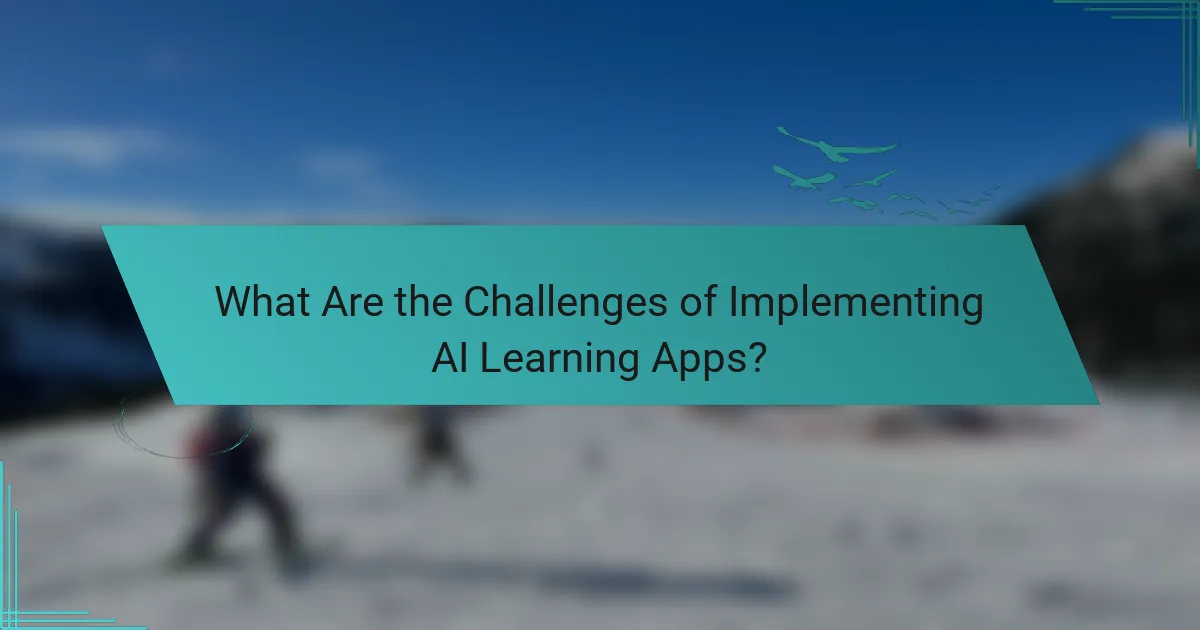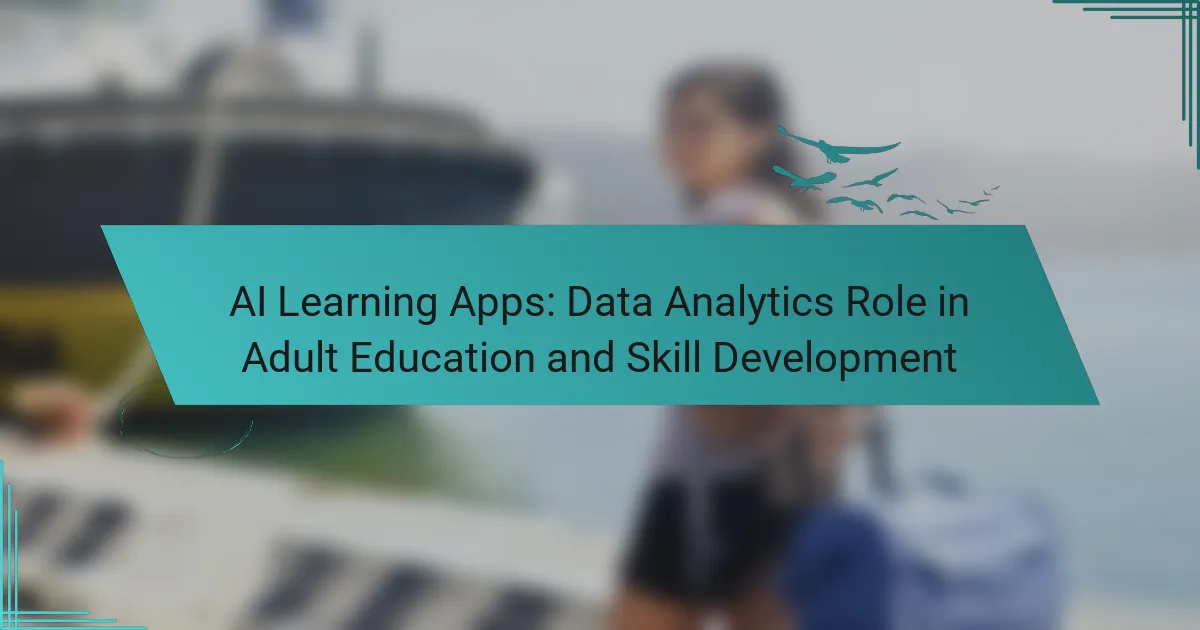AI learning apps are revolutionizing adult education by offering personalized learning experiences that align with individual preferences and requirements. By harnessing the power of data analytics, these applications enhance skill development, enabling educational institutions to tailor programs that effectively address the unique needs of adult learners.

How Do AI Learning Apps Enhance Adult Education?
AI learning apps significantly enhance adult education by providing tailored educational experiences that cater to individual learning styles and needs. These applications leverage data analytics to optimize learning pathways, making skill development more efficient and accessible for adults.
Personalized learning experiences
Personalized learning experiences are a hallmark of AI learning apps, allowing users to engage with content that matches their unique preferences and skill levels. By analyzing user data, these apps can recommend specific courses or modules, ensuring that learners focus on areas where they need improvement.
For example, an adult learner struggling with data analysis might receive targeted exercises and resources to build their competency in that area. This tailored approach can lead to increased motivation and better retention of information.
Real-time feedback and assessment
Real-time feedback is crucial in adult education, and AI learning apps excel in providing immediate insights into a learner’s progress. As users complete exercises or assessments, the app can instantly evaluate their performance and offer constructive feedback.
This immediate response helps learners identify strengths and weaknesses, allowing them to adjust their study strategies accordingly. For instance, if a user consistently struggles with a particular concept, the app might suggest additional resources or practice questions to reinforce understanding.
Scalable learning opportunities
AI learning apps offer scalable learning opportunities, making education accessible to a broader audience. These platforms can accommodate numerous users simultaneously, allowing adults from various backgrounds to learn at their own pace without the constraints of traditional classroom settings.
For instance, an online course on project management can be accessed by hundreds of learners, all benefiting from the same high-quality content while progressing through the material at their own speed. This scalability is particularly valuable for busy adults balancing work and personal commitments.
Integration with existing educational frameworks
Integration with existing educational frameworks is essential for the successful implementation of AI learning apps in adult education. These applications can complement traditional learning methods by aligning with established curricula and standards.
For example, an AI app designed for professional development can integrate with a company’s training programs, ensuring that employees receive consistent and relevant learning experiences. This synergy between technology and traditional education enhances the overall effectiveness of skill development initiatives.

What Role Does Data Analytics Play in Skill Development?
Data analytics plays a crucial role in skill development by providing insights into learner behaviors and outcomes. By analyzing data, educational institutions can tailor programs to better meet the needs of adult learners, enhancing their educational experience and skill acquisition.
Identifying learning patterns
Data analytics helps identify learning patterns by tracking how individuals engage with educational content. For example, analytics can reveal which topics learners struggle with or excel in, allowing educators to adjust their teaching methods accordingly.
By utilizing tools such as learning management systems (LMS), institutions can collect data on user interactions, completion rates, and assessment scores. This information can highlight trends, such as preferred learning styles or common areas of difficulty, enabling personalized learning paths.
Measuring skill acquisition
Measuring skill acquisition involves evaluating the effectiveness of educational programs through data-driven assessments. Analytics can quantify progress by comparing pre- and post-assessment scores, providing a clear picture of how much a learner has improved.
For instance, adult education programs might use standardized tests or practical evaluations to gauge skill levels before and after training. This data can inform decisions on program adjustments and help ensure that learners are gaining the necessary competencies.
Optimizing course content
Optimizing course content is essential for enhancing the learning experience and ensuring relevance. Data analytics allows educators to assess which materials are most effective and which may require updates or replacement.
By analyzing feedback and performance data, institutions can refine their curriculum to focus on high-impact topics and eliminate redundancies. For example, if data shows that a particular module consistently results in low scores, it may indicate a need for revision or additional resources to support learners.

Which AI Learning Apps Are Leading in the Market?
Several AI learning apps are at the forefront of the market, offering innovative solutions for adult education and skill development. Notable platforms include Coursera, edX, Udacity, and LinkedIn Learning, each providing unique features and content tailored to various learning needs.
Coursera
Coursera partners with top universities and organizations to offer a wide range of courses, including data analytics and AI. Users can access both free and paid courses, with the latter often providing certificates upon completion, which can enhance a resume.
Courses typically range from a few weeks to several months, allowing learners to progress at their own pace. Consider exploring specializations that bundle multiple courses for a deeper understanding of specific topics.
edX
edX is another leading platform that offers high-quality courses from prestigious institutions. It provides a mix of free and paid content, with verified certificates available for a fee. The platform emphasizes professional and academic growth, making it suitable for adult learners.
Many edX courses are self-paced, but some may follow a schedule. Look for MicroMasters programs if you want to gain advanced knowledge in a specific field, which can also count towards a full degree in some cases.
Udacity
Udacity focuses on tech-related fields, offering “Nanodegree” programs that are designed in collaboration with industry leaders. These programs are intensive and often require a commitment of several months to complete, making them ideal for serious learners aiming to boost their careers.
While Udacity’s courses are generally more expensive than others, they provide personalized feedback and mentorship, which can significantly enhance the learning experience. Be prepared to dedicate substantial time to projects that demonstrate your skills to potential employers.
LinkedIn Learning
LinkedIn Learning offers a vast library of video courses on various topics, including data analytics and professional development. The platform is subscription-based, allowing unlimited access to courses for a monthly fee, which can be cost-effective for frequent learners.
One advantage of LinkedIn Learning is its integration with LinkedIn profiles, enabling users to showcase completed courses and skills to potential employers. Consider taking advantage of free trials to explore the platform before committing to a subscription.

What Are the Key Features of Effective AI Learning Apps?
Effective AI learning apps incorporate features that enhance user engagement and personalize the learning experience. Key elements include adaptive learning algorithms, user-friendly interfaces, and comprehensive analytics dashboards that help track progress and inform instructional strategies.
Adaptive learning algorithms
Adaptive learning algorithms adjust the content and pace of learning based on individual user performance and preferences. These algorithms analyze data from user interactions to identify strengths and weaknesses, allowing the app to tailor lessons accordingly.
For instance, if a learner struggles with a specific topic, the app may provide additional resources or practice exercises in that area. This personalized approach can significantly improve retention and mastery of skills.
User-friendly interfaces
A user-friendly interface is crucial for ensuring that learners can navigate the app with ease. Intuitive design elements, such as clear menus, straightforward navigation, and visually appealing layouts, enhance user experience and reduce frustration.
Effective apps often include features like drag-and-drop functionality, interactive elements, and responsive design to cater to various devices. This accessibility encourages consistent use and engagement from adult learners.
Comprehensive analytics dashboards
Comprehensive analytics dashboards provide users and educators with insights into learning progress and outcomes. These dashboards typically display metrics such as completion rates, time spent on tasks, and assessment scores, allowing for data-driven decision-making.
For example, an educator can use these analytics to identify which topics require more focus or to adjust teaching strategies based on learner performance. This data-centric approach supports continuous improvement in both teaching and learning processes.

How Can Educators Leverage AI Learning Apps?
Educators can leverage AI learning apps to enhance adult education and skill development by personalizing learning experiences and utilizing data analytics to track progress. These tools allow for tailored content delivery, making it easier to meet diverse learner needs.
Integrating apps into curricula
Integrating AI learning apps into existing curricula involves aligning app content with learning objectives. Educators should select applications that complement traditional teaching methods and provide interactive elements to engage learners. For instance, using an app that offers real-time quizzes can reinforce concepts taught in class.
It’s essential to ensure that the technology is user-friendly and accessible. Providing training sessions for both educators and students can facilitate smoother integration and encourage consistent usage. Consider piloting a few apps before full-scale implementation to gauge their effectiveness in your specific educational context.
Utilizing data for student engagement
Data analytics from AI learning apps can significantly enhance student engagement by providing insights into individual learning patterns and performance. Educators can use this data to identify areas where students struggle and adapt their teaching strategies accordingly. For example, if analytics show low engagement in a particular module, educators can modify the content or approach to make it more appealing.
Regularly reviewing analytics reports can help educators track progress over time and adjust interventions as needed. Setting up a feedback loop where students can also share their experiences with the app can further enhance engagement and ensure the tools remain relevant to their learning journey.

What Are the Challenges of Implementing AI Learning Apps?
Implementing AI learning apps in adult education faces several challenges, including technological limitations, user resistance, and data privacy concerns. These factors can hinder the effective integration of AI tools into existing educational frameworks.
Technological Limitations
Technological limitations can significantly impact the deployment of AI learning apps. Many educational institutions may lack the necessary infrastructure, such as high-speed internet and compatible devices, to support advanced AI functionalities. This can lead to inconsistent user experiences and limit the effectiveness of the learning tools.
Additionally, the complexity of AI algorithms may require specialized knowledge for implementation and maintenance. Institutions should consider investing in training for staff to ensure they can effectively manage and utilize these technologies.
User Resistance
User resistance is a common challenge when introducing AI learning apps. Adult learners may feel apprehensive about using new technologies, especially if they are not familiar with digital tools. This reluctance can stem from fear of the unknown or concerns about the effectiveness of AI in education.
To mitigate resistance, institutions should offer comprehensive training sessions and provide ongoing support. Highlighting the benefits of AI learning apps, such as personalized learning experiences and improved skill development, can also encourage user adoption.
Data Privacy Concerns
Data privacy concerns are critical when implementing AI learning apps, as these tools often collect and analyze personal information. Adult learners may be wary of how their data is used, leading to mistrust in the technology. Institutions must prioritize transparency and ensure compliance with relevant data protection regulations, such as GDPR in Europe.
Establishing clear data usage policies and obtaining informed consent from users can help alleviate these concerns. Regularly communicating how data is protected and used can further build trust and encourage engagement with AI learning platforms.
